On Monday, Donald Trump issued a statement calling for “a total and complete shutdown” of Muslims entering the US. To many in the United States and around the world, his were the words of pure hate: the banning of an entire religious community, stereotyped, homogenized, erased and criminalized.
Muslim Americans, who make up around 1% of the American population by conservative estimates, are feeling targeted and grossly misunderstood.
What defines a Muslim in this country? What makes a Muslim American? The answers to the question are endless. Here are eight perspectives.
Sabiha Basrai, 33, graphic designer – Oakland, California

Basrai grew up in California’s Silicon Valley, the daughter of a graphic designer and video producer who emigrated from India.
Being in an overwhelmingly white environment at the time, Basrai says the mosque played a big part in her childhood, serving a comforting, community-center role, that she and her family could not find elsewhere.
“There, I could feel confident learning to read Arabic. I could eat the food that was part of my heritage, I could celebrate festivities like Eid and Ramadan.”
Basrai remembers a painful conversation with her parents when she was just eight years old. Saddam Hussein had just invaded Kuwait. In events that were later branded the Gulf war, the United States led a coalition of countries to war against Iraq.
“My parents told me to not tell anyone at school I was Muslim.”
“I cannot imagine how hard that was for my parents to sit me down and say that to me that all my best friends – all those people I who came to my birthday parties and where I went to their birthday parties – that I had to be careful and cautious of them.”
By the time she was 19 and 9/11 hit, she was a student California State Polytechnic University, a very white campus where the Republican club was quite powerful, she says.
“They [members of the Republican club] put up posters making fun of Muslims, calling for the nuclear bombing of Afghanistan, making fun of people with scarves and turbans.”
It was a formative time.
“I was put in a position of having to claim my Muslim identity as a political act.”
“Anyone who believes that Muslims are one evil, foreign monolithic thing, they are denying that I exist. And they should take a look at themselves, and ask themselves, why it is that they cannot see me.”
Tahanie Aboushi, 30, attorney – New York, New York
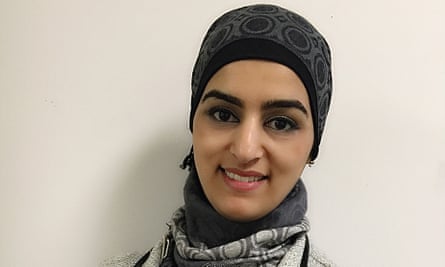
Born and raised in New York City, Aboushi’s father owned a grocery store where her mother helped out. There was plenty of work to be done at home too; Aboushi has nine siblings.
Some of her sisters have chosen to wear the veil, she says, others haven’t.
“We were taught this is your religion, this is your culture. But then there was always an understanding that then, this is your free will.”
Hers was not the easiest of paths to success. While the first part of her childhood was spent in a very diverse neighborhood in Brooklyn, the last few years of her adolescence were spent in Staten Island, where most families and fellow school attendees were white.
“It was nothing like I’d ever seen in my life. Everything was very cookie-cutter. Everyone looked the same.”
“I would dread going to school. Kids would ask me are you Saddam’s daughter? They would tell me I was a terrorist, to go back to my country.”
That difference could breed such hate was difficult for her to conceive.
“All the time, I couldn’t understand. Why are you so angry that I don’t look like you?”
Nauman Akhtar, 38, orthopedic surgeon – Reston, Virginia
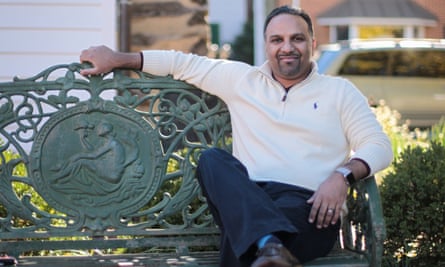
As Akhtar speaks to me after coming home from his day at work, our conversation is very briefly interrupted by his three-year-old son, knocking on the door to his study. The toddler wants to spend time with his father.
“I love my job, but my family is my priority,” he says, explaining that he takes Friday afternoons off to be with his family of four, and makes sure to have his weekends free too, in as much as that is doable. Akhtar was brought up by two doctor parents in a small town in Michigan. His parents met in medical school in Pakistan and recently moved to Virginia to be close to their grandchildren.
The greater Washington DC area has a vast and diverse Muslim community, Akhtar points out, many of whom are serving the United States.
“They care deeply,” he says. “They are in every sense American. This is what we do, this is who we are, this is everything we know. Being American.”
Bashirah Mack, 32, program coordinator – Chicago, Illinois
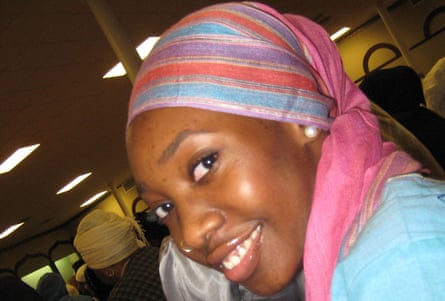
Bashirah Mack’s parents, African American converts to Islam, fled South Carolina before she was born because of racism. They were in search of fellow members of the African American Muslim community, which they found in Atlanta.
“They migrated in search of a better opportunity.”
In Atlanta, she learned about the deep roots of Islam in this country. “This history has been passed down to me not just through academia, but through my own family’s oral history,” she says.
“Many Africans went through this forced migration,” she explains, talking about the men and women brought to the United States to be enslaved and coerced into brutal forced labor between the early 17th and 19th centuries.
“I come from that experience. Sometimes I feel like we are Americans by force. But we’ve been here. We’ve been making enormous contributions to the country in many ways. Slavery built this country.”
“I am a Muslim and my ancestors have been here for hundreds of years,” Mack says. “My Americanness cannot be denied.”
Jabril Ahmad, 22, tech supporter – Detroit, Michigan
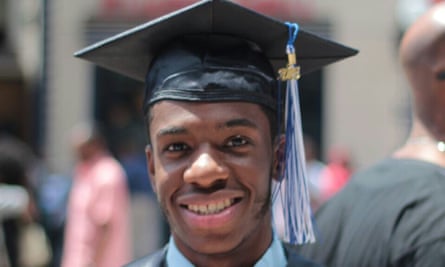
Jabril Ahmed says he likes the job, because he likes helping people one-on-one, but ultimately he would like to go back to school and get a degree in nursing.
As a boy in Detroit, Ahmed says he attended the Islamic school and was exposed to a variety of cultures from around the world.
“Throughout school it was a beautiful experience. It definitely gave me a chance to get to know a lot of people I would never have had the opportunity to get to know.”
Ahmed doesn’t understand why Muslims are expected to openly condemn acts of terror supposedly committed in the name of Islam.
“Those people [committing terrorist acts] aren’t real Muslims, they claim to be, but they aren’t,” he says, pointing to the fact that making one billion or so Muslims worldwide accountable for the acts of violent individuals acting against basic religious principles is absurd.
“I don’t see the wider Christian community coming out and condemning Christian acts of violence,” he says, referencing America’s epidemic of mass shootings, overwhelmingly committed by people who would be categorized as white and Christian.
“There’s a really big double standard as far as that goes.”
Atiya Hasan Mohiuddin, 31, engineer – Chicago, Illinois
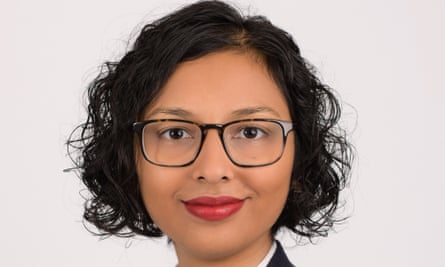
Brought up in a small Pennsylvania town called York, in a relatively white, and what she describes as a largely tolerant community, Atiya Hasan Mohiuddin, 31, figured out at an early age she wanted to be an engineer. The next step, she says, was finding out which was the best school to go to.
The answer may have daunted a few: it was MIT.
What happened next? “I worked really hard,” she says.
She got in.
Today, Hasan Mohiuddin works in the architecture engineering industry in Chicago, Illinois.
There are times where her faith feels stronger, and times when it feels less strong.
But her Muslim identity is definite. “I identify as Muslim and was brought up as Muslim,” she says.
Hasan Modiuddin also identifies as “a classic nerd.”
“I love books and I love Star Wars,” she says.
“I am less weird about my love of Star Wars now than when I was young,” she says. “But I will definitely be dragging my husband to see the movie.”
Syed Mohiuddin, 33, consultant – Chicago, Illinois

Syed is preparing for a very important race he will be running in over Christmas, when he goes back home to Troy, Michigan, for the winter break.
His opponent? His 13-year-old nephew who beat him “soundly” in an impromptu one-mile run last time the family all got together over Memorial Day weekend.
He vowed to not let the losing experience happen again.
So this holiday season, Mohiuddin will be challenging his nephew once more, as generations young and old of his family cheer them on. “It’s also a good excuse to get back in shape,” the management consultant explains a little self-deprecatingly.
Before moving to Chicago, Mohiuddin lived in Detroit where he built ties among various Muslim communities. In 2014, his efforts culminated in bringing 20,000 people to Detroit having convinced the Islamic Society of North America to hold their national convention there.
Mohiuddin says his faith has given him “an identity and a set of values”.
“It has been character building, helped me believe in democracy, equality, and trying to create good people in good societies,” he says.
Sara Jawhari, 25, storyteller – Kansas City, Missouri
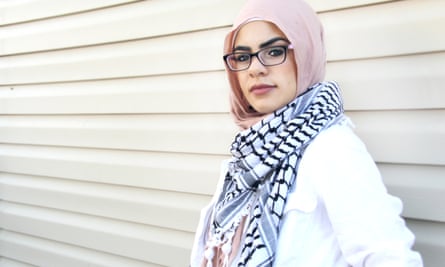
Sara Jawhari’s passion is visual multimedia storytelling done for a good cause, she says.
The journalism-trained 25-year-old writes, produces video and takes photos, having traveled to the Middle East to interview and help craft stories of Syrian refugees.
She is happy, she says, as long as she feels she is being a “loving, active member of the community”.
“My parents instilled the importance of giving rather than expecting a gift. Charitable giving is a foundation in our religion.”
Growing up, her mother was a teacher at the Islamic school, which Jawhari also attended, and her father was a handy man.
Jawhari says her mother, who is now also a professor of Arabic at a Catholic university in Kansas City, was very clear with her children that they should be proud of being able to speak multiple languages and identifying with multiple cultures, including the American one.
“It was never this or that,” Jawhari who identifies as Muslim, American and Palestinian says. “It was about accepting our culture of being here in America and staying true to our background.”
“I am a visual Muslim because I choose to wear my headscarf every day,” she adds.
This is a way to show people her humanity, she says.
“I allow my character to speak for myself.”
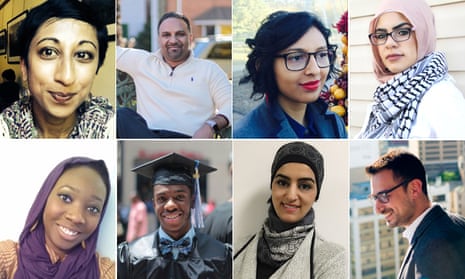
Comments (…)
Sign in or create your Guardian account to join the discussion